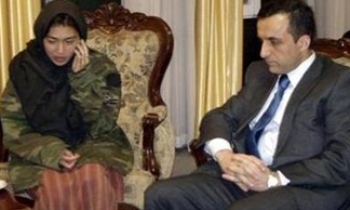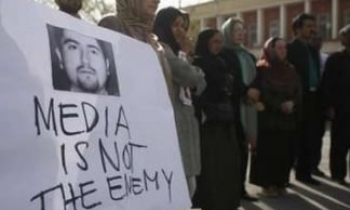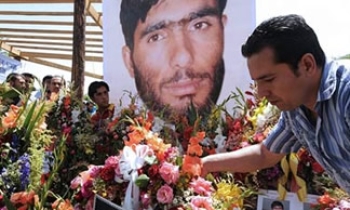The Alfred Friendly Press Fellowships (AFPF) is an American non-profit, non-governmental organization that gives developing-world journalists the opportunity to work as reporters in American newsrooms. The program, which runs from March to September, is offered annually to approximately ten professional print journalists between the ages of 25 and 35.
Sharing the goals of AFPF, the Daniel Pearl Foundation partnered with AFPF in 2003 to offer special fellowships to honor the life and work of journalist Daniel Pearl — the Wall Street Journal South Asia bureau chief who was kidnapped and murdered in Pakistan in 2002. Daniel Pearl Fellows have worked at the Washington DC bureau of The Wall Street Journal and the Los Angeles Times. Applicants for the Daniel Pearl Fellowships (DPF) must come from areas where Daniel Pearl worked as a journalist – South Asia, the Middle East, and North Africa.
The Friendly Fellows, including the Daniel Pearl Fellows, are given an in-depth, practical introduction to the professional and ethical standards of the U.S. print media. Unique among the many training programs available to journalists, AFPF is the only one to offer a non-academic, long-term, hands-on experience in a single newsroom.
PROGRAM GOALS:
- To provide the Fellow with experience in reporting, writing and editing that will enhance future professional performance;
- To enable the Fellow to gain a practical understanding of the function and significance of the free press in American society;
- To transfer knowledge gained on the program to colleagues at home;
- To foster continuing ties between free press institutions and journalists in the United States and their counterparts in other countries.
CRITERIA of ELIGIBILITY:
- Current full-time employment as a journalist for the news or editorial departments of independent newspapers, wire services, online publications, or magazines of general public interest in a developing country;
- At least three years of professional experience as a journalist in the print/online media;
- Citizenship of a developing country;
- Early to mid-career status and between 25 and 35 years old;
- A demonstrated personal commitment to a career in journalism in a developing country;
- Ability and desire to share what is learned on the fellowship with other journalists at home;
- Endorsement from the management of the home publication;
- An excellent command of both written and spoken English as all activities are conducted in English.
THE FELLOWSHIP PROGRAM:
In the conviction that a strong, free press is essential to the healthy functioning of a democracy, the late Alfred Friendly, a Pulitzer Prize-winning reporter and former managing editor of The Washington Post, conceived a fellowship program that would both impart American journalistic traditions and respond to worldwide interest in the dissemination of fair and accurate news.
It was Alfred Friendly’s belief that working side by side with reporters and editors is the best way to absorb the practical realities of journalism in this country and the instrumental role it plays in our society. Therefore, he created the program that bears his name to immerse approximately ten journalists each year for six months in American newsrooms. Between 1984 and 2005, the ALFRED FRIENDLY PRESS FELLOWSHIPS (AFPF) has trained 232 journalists from 74 countries.
In addition to the six month newsroom experience, the program provides an allowance for journalism books, conferences, short-term professional visits and a mentor exchange; offer a Training the Trainer class to prepare our Fellows to share what they’ve learned on the program; work more closely with home and host news organizations to create specific plans for the Fellows; offer specialized fellowships by topic (business, investigations, health, etc.) and region (Muslim world); and teach newsroom management skills. Our goal is to increase the level of usefulness and excellence of the AFPF program in the 21st century and to broaden the impact of the program on countries that are working to understand press freedom.
Sharing the goals of AFPF, the Daniel Pearl Foundation partnered with AFPF in 2003 to offer special fellowships to honor the life and work of journalist Daniel Pearl — the Wall Street Journal South Asia bureau chief who was kidnapped and murdered in Pakistan in 2002. Daniel Pearl Fellows – two from Pakistan and one from Yemen – have worked at the Los Angeles Times and Washington DC bureau of The Wall Street Journal. Applicants for the Daniel Pearl Fellowships (DPF) must come from areas where Daniel Pearl worked as a journalist — South Asia, the Middle East, and North Africa. While DANIEL PEARL FELLOWS are Friendly Fellows and participate in all fellowship activities, they may receive opportunities not offered to other Friendly Fellows that support the goals of the Daniel Pearl Foundation — to encourage dialogue among people of different cultures, reduce cultural and religious hatred and create a platform for responsible and creative journalism.
The fellowship program begins in March with a two-week orientation seminar in Washington designed to prepare the Fellows – both personally and professionally – for the challenges of living and working in the United States. At the middle of the program, Fellows and staff come together for a week at The Poynter Institute in St. Petersburg, Florida for seminars focused on writing, editing and newsroom coaching. A final seminar in Washington reunites the Fellows and prepares them to train other journalists upon returning to their home countries. It also allows Fellows to compare and evaluate their experiences and discuss their impressions of the American media. Fellows return to their home countries in early September to begin sharing their knowledge and skills with colleagues, editors and publishers in their home newsrooms.
The Fellowship covers all costs of program-related international and domestic U.S. travel, health insurance and provides a monthly stipend to cover basic living expenses. It is highly recommended that Fellows bring additional money with them. The stipend is not sufficient to provide support for spouses or other dependents. We recommend family remain at home for the duration of the fellowships









